Hydration and team Sport Cognitive Function, Technical Skill and Physical Performance
Published
January 2021
Author
Kelly Barnes, MS, CPT; Lindsay Baker
Topics
Body Composition , Sports Nutrition , Training & Performance , Recovery , Athlete Health

KEY POINTS:
- Team sport athletes are at risk of training and competing in a hypohydrated state when fluid losses are large and/or there are challenges with fluid availability or opportunity to drink.
- Technical skill and cognitive function are essential to team sport athlete performance and may be impaired with hypohydration, especially when combined with heat stress.
- The mechanism of cognitive impairment with hypohydration is not fully understood. It may be that the symptoms often associated with hypohydration (e.g., thirst, headache, fatigue, negative mood) are a distraction to the individual performing the cognitive tasks.
- Decrements in cognitive function, skill and physical performance in team sports are more likely to occur when hypohydration levels are > 2% body mass loss, but there is significant inter-individual variability in the effect of hypohydration on team sport performance.
INTRODUCTION
Athletes lose body fluid during exercise primarily through sweating. The body fluid balance between sweat losses and fluid intake during exercise may lead to these athletes training and competing in a hypohydrated state. The environmental conditions, body size, protective equipment and exercise demands of team sports vary considerably, leading to a large inter-sport variability in sweat losses. However, even within sports, there can also be large inter-individual variability in sweat losses. The published guidelines on exercise and fluid replacement recommend drinking during exercise to prevent greater than 2% body mass loss (BML), and since sweating rates and sweat electrolyte losses differ greatly between athletes, hydration plans should be individualized (Maughan & Shirreffs, 2010; McDermott et al., 2017; Sawka et al., 2007; Thomas et al., 2016).
It is clear that hypohydration of more than 2% BML, especially in hot and humid environments, can impair endurance performance (Cheuvront & Kenefick, 2014; Sawka et al., 2007). This Sports Science Exchange article will focus on the impact of hypohydration on team sport performance, which is less established. Performance in team sport is a combination of both physical and mental domains. The mental domains include sport-specific technical skills that are related to precision and motor control, such as shooting, passing and dribbling, but also cognitive aspects including, but not limited to, motor response and reaction time, visuomotor function, executive function, memory and information processing. The physical demands of team sports include sprinting, lateral movements, jumping and intermittent high intensity running, to name a few. These are defined in Table 1 (Nuccio et al., 2017).
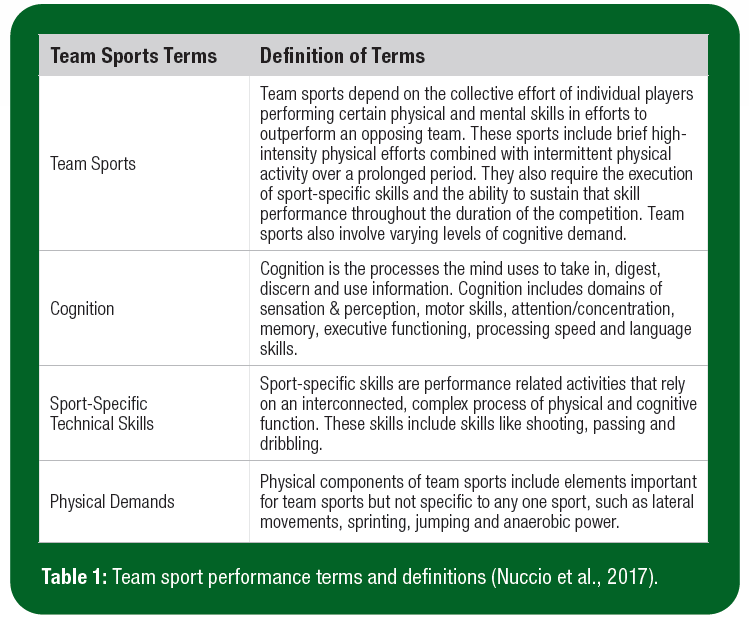
SPORT-SPECIFIC RISK FOR HYPOHYDRATION
Sport-specific risks for hypohydration are based on environmental conditions, exercise intensity and the availability and opportunity for fluid intake, as seen in Figure 1 (Belval et al., 2019; Nuccio et al., 2017). Of the sports reviewed, those with the highest risk for hypohydration were soccer, lacrosse and rugby, followed by American football, Australian rules football, ice hockey and field hockey. Basketball, Gaelic football, cricket, baseball, softball, beach volleyball, court volleyball, futsal, netball, water polo and badminton were classified as lower risk (Belval et al., 2019; Nuccio et al., 2017). However, there can be high variability in the risk for hypohydration within sports due to different environmental conditions across the sport season and locations of play, playing positions (body size, physical demands) and fluid availability/opportunity to drink during training and competition.
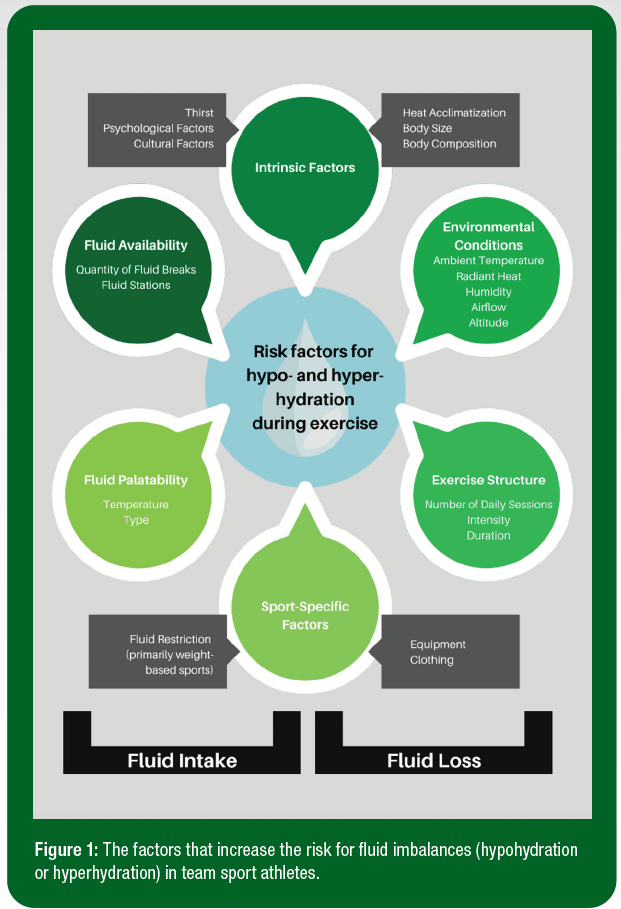
HYPOHYDRATION AND MENTAL/PHYSICAL DOMAINS OF TEAM SPORTS
The literature is mixed regarding the impact of hypohydration on the mental aspects of team sports. Some have found decrements to certain aspects of cognition and technical skills (Baker et al., 2007a, b; D'Anci et al., 2009; Dougherty et al., 2006; Hoffman et al., 1995; MacLeod & Sunderland, 2012) while others have found no performance impairment (Adam et al., 2008; Edwards et al., 2007; Ely et al., 2013; Grego et al., 2005; McGregor et al., 1999; Serwah & Marino, 2006). Wittbrodt et al. (2018) suggested that there is a potential dose response relationship between body water loss, via fluid restriction, heat stress, exercise or exercise + heat stress, and cognitive-motor deficits, indicating that as the percent BML increases, the cognitive impairment also increases. A study on military personnel found that declines in cognitive performance typically start around 2% BML and increase with greater levels of dehydration (Gopinathan et al., 1988) – similar to the physical performance decrements seen in endurance athletes (Cheuvront & Kenefick, 2014; Gopinathan et al., 1988). However, another group reported that dehydration up to about 3%, without heat stress, is unlikely to impair cognitive or psychomotor function in military personnel (Adam et al., 2008). Table 2 summarizes the literature on the effects of hypohydration on cognitive domains and team sport technical skills. Of the sports studied (baseball, basketball, cricket, soccer, rowing, football, lacrosse and tennis), there seems to be some performance decrements in shooting/bowling accuracy, decision-making speed, reaction speed, memory, vigilance and fine motor speed, whereas passing and concentration were less affected. A point to note is that most of the cognitive assessments were standard cognitive tests and not sport-specific, with the exception of the cognitive tests done on field hockey athletes (MacLeod & Sunderland, 2012).
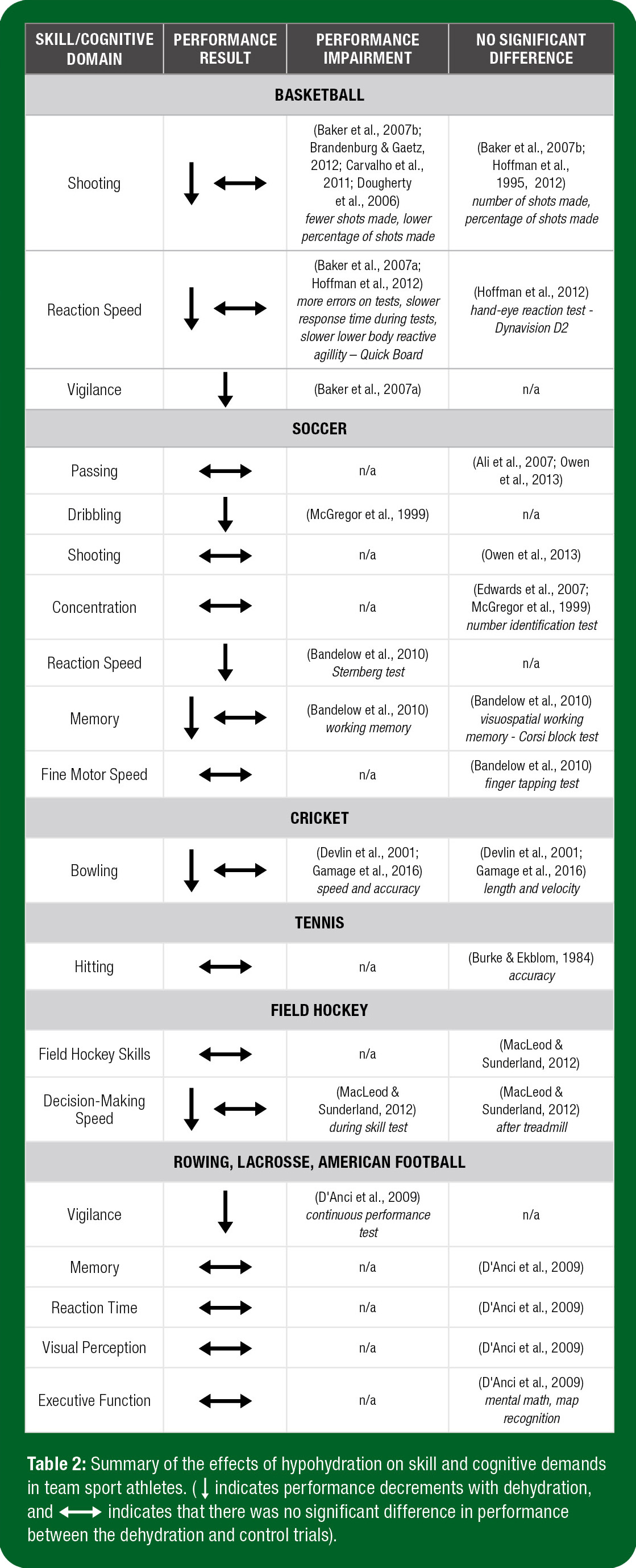
Some of the physical components of team sports include elements important for team sports, but not specific to any one sport, such as lateral movements, sprinting, jumping and anaerobic power. The impact hypohydration has on these physical domains has mixed results in the literature. Overall, sprinting speed seems to be slower when hypohydration is mild to moderate vs. euhydration (Baker et al., 2007b; Davis et al., 2015; Devlin et al., 2001; Dougherty et al., 2006; Gamage et al., 2016; McGregor et al., 1999). The other performance measures impaired with hypohydration were lateral movement speed (Baker et al., 2007b; Dougherty et al., 2006) and combination drill speed (Baker et al., 2007b). However, some studies found no differences in sprinting speed (Ali et al., 2011; Ali & Williams, 2013; Carvalho et al., 2011) or combination drill speed (Dougherty et al., 2006). The research on distance covered during a Yo-Yo test is equivocal, with one study in soccer players showing no difference between prescribed water (-0.3% BML), ad libitum water (-1.1% BML) and no fluid (-2.5% BML) intake, and another study showing a decrease in distance covered when no fluid was given (-2.4% BML) or only mouth rinse (-2.1% BML) vs. water intake (-0.7% BML) (Edwards et al., 2007; Owen et al., 2013). Most studies found no significant difference between the no fluid and fluid trials in regards to maximum jump height, peak jump power or anaerobic power (Baker et al., 2007b; Burke & Ekblom, 1984; Dougherty et al., 2006; Hoffman et al., 1995, 2012; Yoshida et al., 2002), yet some showed decreased aerobic power with hypohydration especially during later tests or with higher levels of fluid losses (Hoffman et al., 1995; Yoshida et al., 2002). Figure 2 indicates the percentage of studies showing an effect of hypohydration in each category of team sport performance.
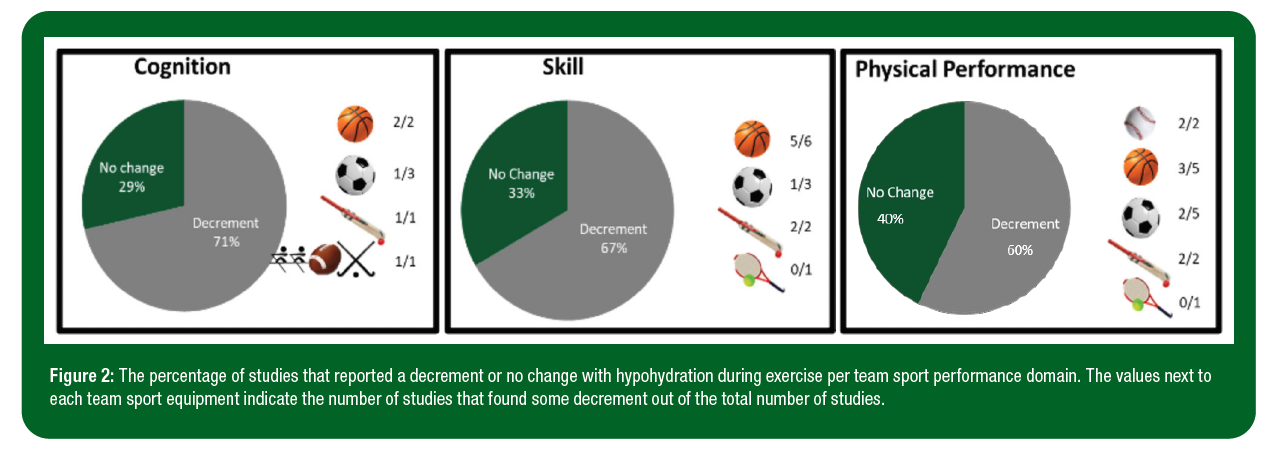
REHYDRATION AFTER EXERCISE-INDUCED DEHYDRATION
An additional area that is less explored is the effect that rehydration after dehydrating exercise has on cognitive/skill sport performance. Cian et al., (2000) found that dehydration via exercise alone and heat stress alone caused performance decrements (increased response times and short-term memory decline), but those decrements disappeared after 3.5 hours when compared to a euhydrated control. During the 3.5 hours after exercise, the perception of fatigue was higher with both methods of dehydration and improved with fluid ingestion. When the subjects were rehydrated after the dehydration period, they were able to maintain long term memory, whereas long term memory declined when dehydrated (Cian et al., 2000). A study with healthy college age individuals also found that when individuals were dehydrated via fluid restriction, Profile of Mood States (POMS) scores (vigor) and cognitive performance (short term memory and attention) were impaired. After rehydrating these individuals, the POMS scores, short term memory, attention and reaction were all improved (Zhang et al., 2019). More work is needed to determine the lasting effects of hypohydration on cognitive and skill domains after athletes rehydrate post-exercise.
MECHANISMS OF HYPOHYDATION RELATED IMPAIRMENTS IN SOME STUDIES
The potential mechanisms for the effects of hypohydration on cognition and team sport skill are not fully understood. It has been suggested that symptoms associated with hypohydration, such as thirst, headache or negative mood may be a distraction to the individual performing the cognitive tasks and contribute to a decline in performance (Cheuvront & Kenefick, 2014). The fatigue and increased perception of exertion that often accompany hypohydration could also explain some of the performance impairments reported (Nuccio et al., 2017). However, perhaps due to genetics or training adaptations, some individuals, though thirsty, exerted and fatigued, may be better than others at increasing concentration to overcome the distractors (Cheuvront & Kenefick, 2014).
Heat stress could exacerbate the symptoms and cognitive performance impairments of hypohydration. Some research suggests that there are separate effects of exercise heat stress and exercise heat stress combined with dehydration on cognition tasks. A moderate increase in body core temperature has the potential to improve cognition (Schmit et al., 2017), potentially due to increased cerebral blood flow (Hocking et al., 2001). However, there may be a threshold in which cognitive performance begins to decline with thermal strain, and this may be based more on subjective feelings of discomfort rather than objective measurements of the environment or body temperature (Gaoua et al., 2017). In a recent study, visuomotor performance declined with exercise heat stress, with additional impairments when dehydration was added (Wittbrodt et al., 2018). Furthermore, brain activation increased with dehydration but not exercise heat stress alone (Wittbrodt & Millard-Stafford, 2018; Wittbrodt et al., 2018), suggesting a greater effort was needed to complete the cognitive tasks.
LIMITATIONS
Summarizing the effect of hypohydration on team sport performance can be challenging. For example, acute exercise has a small, positive, short-lived effect on cognitive performance (Chang et al., 2012). Elevated body core temperature, concomitant with exercise and hypohydration, can also affect cognitive function (Bandelow et al., 2010). Additionally, the technical skill, cognitive and physical performance tests being administered must be sensitive enough to detect true changes due to nutritional interventions (Lieberman, 2007). Taken together, the effect of hydration status on team sport performance has been mixed. However, it seems that hypohydration is more likely to impair cognition, technical skill and physical performance at higher levels of BML (> 2%) and when the method of dehydration involves heat stress (Figure 3).
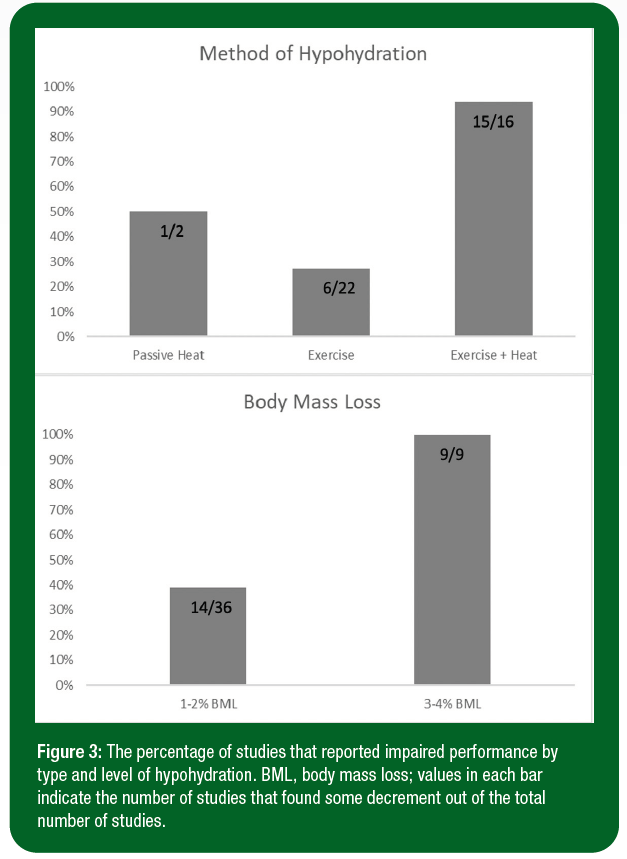
PRACTICAL APPLICATIONS
- The factors that are most associated with an increased risk of hypohydration in team sports are summarized in Figure 4. When at least two of these risk factors are met, it is likely that there will be skill/cognitive implications for team sport performance. If all three are met, then it is highly likely that team sport performance will suffer (Nuccio et al., 2017).
- Athletes and practitioners should strive to understand individual fluid losses during team sport play and provide customized hydration plans accordingly.
- When cognitive, skill and physical domains are critical, athletes should keep BML under about 2%, especially when environmental conditions are hot and humid. To do this, athletes should be given access to fluid and adequate opportunities to drink.
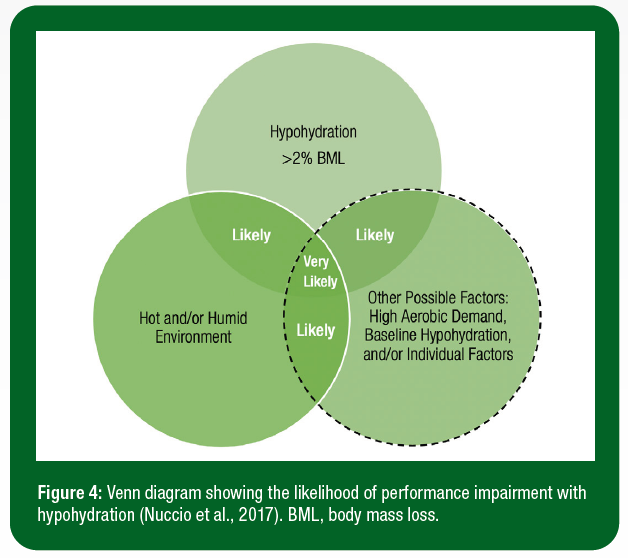
SUMMARY
There is large intra- and inter-sport variability in athletes’ sweat losses. Access to fluid and the opportunity to rehydrate during training and competition is also varied between sports. This can result in some team sport athletes performing in a hypohydrated state. The effect of hypohydration on team sport performance has been mixed. However, it seems that hypohydration is more likely to impair cognition, technical skill and physical performance when the body mass deficit is > 2% and combined with heat stress. The mechanism underlying these decrements is not completely understood but may be based in both perception and physiology. To mitigate the risk of performance decrements, athletes should strive to replace individual losses to stay within 2% BML when possible.
REFERENCES
Adam, G.E., R. Carter 3rd, S.N. Cheuvront, D.J. Merullo, J.W. Castellani, H.R. Lieberman, and M.N. Sawka (2008). Hydration effects on cognitive performance during military tasks in temperate and cold environments. Physiol. Behav. 93:748-756.
Ali, A., and C. Williams (2013). Isokinetic and isometric muscle function of the knee extensors and flexors during simulated soccer activity: effect of exercise and dehydration. J. Sports Sci. 31:907-916.
Ali, A., C. Williams, C.W. Nicholas, and A. Foskett (2007). The influence of carbohydrate-electrolyte ingestion on soccer skill performance. Med. Sci. Sports Exerc. 39:1969-1976.
Ali, A., R. Gardiner, A. Foskett, and N. Gant (2011). Fluid balance, thermoregulation and sprint and passing skill performance in female soccer players. Scand. J. Med. Sci. Sports 21:437-445.
Baker, L.B., D.E. Conroy, and W.L. Kenney (2007a). Dehydration impairs vigilance-related attention in male basketball players. Med. Sci. Sports Exerc. 39:976-983.
Baker, L.B., K.A. Dougherty, M. Chow, and W.L. Kenney (2007b). Progressive dehydration causes a progressive decline in basketball skill performance. Med. Sci. Sports Exerc. 39:1114-1123.
Bandelow, S., R. Maughan, S. Shirreffs, S., K. Ozgünen, S. Kurdak, G. Ersöz, M. Binnet, and J. Dvorak (2010). The effects of exercise, heat, cooling and rehydration strategies on cognitive function in football players. Scand. J. Med. Sci. Sports 20(Suppl 3):148-160.
Belval, L.N., Y. Hosokawa, D.J. Casa, W.M. Adams, L.E. Armstrong, L.B. Baker, L. Burke, S. Cheuvront, G. Chiampas, J. González-Alonso, R.A. Huggins, S.A. Kavouras, E.C. Lee, B.P. McDermott, K. Miller, Z. Schlader, S. Sims, R.L. Stearns, C. Troyanos, and J. Wingo (2019). Practical hydration solutions for sports. Nutrients 11:1550.
Brandenburg, J.P., and M. Gaetz (2012). Fluid balance of elite female basketball players before and during game play. Int. J. Sport Nutr. Exerc. Metab. 22:347-352.
Burke ER, and B. Ekblom (1984) Influence of fluid ingestion and dehydration on precision and endurance performance in tennis. In: Curr. Top. Sports Med., N. Bachl., L. Prokop, and R. Suckert, eds. 379-388.
Carvalho, P., B. Oliveira, R. Barros, P. Padrão, P. Moreira, and V.H. Teixeira (2011). Impact of fluid restriction and ad libitum water intake or an 8% carbohydrate-electrolyte beverage on skill performance of elite adolescent basketball players. Int. J. Sport Nutr. Exerc. Metab. 21:214-221.
Chang, Y.K., J.D. Labban, J.I. Gapin, and J.L. Etnier (2012). The effects of acute exercise on cognitive performance: a meta-analysis. Brain Res. 1453:87-101.
Cheuvront, S.N., and R.W. Kenefick (2014). Dehydration: physiology, assessment, and performance effects. Compr. Physiol. 4:257-285.
Cian, C., N. Koulmann, P.A. Barraud, C. Raphel, C. Jimenez, and B. Melin (2000). Influences of variations in body hydration on cognitive function: Effect of hyperhydration, heat stress, and exercise-induced dehydration. J. Psychophys. 14:29-36.
D'Anci K,E., A. Vibhakar, J.H. Kanter, C.R. Mahoney, and H.A. Taylor (2009). Voluntary dehydration and cognitive performance in trained college athletes. Percept. Mot. Skills 109:251-269.
Davis, J.K., C.M. Laurent, K.E. Allen, J.M. Green, N.I. Stolworthy, T.R. Welch, and M.E. Nevett (2015). Influence of dehydration on intermittent sprint performance. J. Strength Cond. Res. 29:2586-2593.
Devlin, L.H., S.F. Fraser, N.S. Barras, and J.A. Hawley (2001). Moderate levels of hypohydration impairs bowling accuracy but not bowling velocity in skilled cricket players. J. Sci. Med. Sport 4:179-187.
Dougherty, K.A., L.B. Baker, M. Chow, and W.L. Kenney (2006). Two percent dehydration impairs and six percent carbohydrate drink improves boys basketball skills. Med. Sci. Sports Exerc. 38:1650-1658.
Edwards, A.M., M.E. Mann, M.J. Marfell-Jones, D.M. Rankin, T.D. Noakes, and D.P. Shillington (2007). Influence of moderate dehydration on soccer performance: physiological responses to 45 min of outdoor match-play and the immediate subsequent performance of sport-specific and mental concentration tests. Br. J. Sports Med. 41:385-391.
Ely, B.R., K.J. Sollanek, S.N. Cheuvront, H.R. Lieberman, and R.W. Kenefick (2013). Hypohydration and acute thermal stress affect mood state but not cognition or dynamic postural balance. Eur. J. Appl. Physiol. 113:1027-1034.
Gamage, J.P., A.P. De Silva, A.K. Nalliah, and S.D. Galloway (2016). Effects of dehydration on cricket specific skill performance in hot and humid conditions. Int. J. Sport Nutr. Exerc. Metab. 26:531-541.
Gaoua, N., R.F. de Oliveira, and S. Hunter (2017). Perception, action, and cognition of football referees in extreme temperatures: impact on decision performance. Front. Psychol. 8:1479.
Gopinathan, P.M., G. Pichan, and V.M. Sharma (1988). Role of dehydration in heat stress-induced variations in mental performance. Arch. Environ. Health 43:15-17.
Grego, F., J.M. Vallier, M. Collardeau, C. Rousseu, J. Cremieux, and J. Brisswalter (2005). Influence of exercise duration and hydration status on cognitive function during prolonged cycling exercise. Int. J. Sports Med. 26:27-33.
Hocking, C., R.B. Silberstein, W.M. Lau, C. Stough, and W. Roberts (2001). Evaluation of cognitive performance in the heat by functional brain imaging and psychometric testing. Comp. Biochem. Physiol. A Mol. Integr. Physiol. 128:719-734.
Hoffman, J.R., H. Stavsky, and B. Falk (1995). The effect of water restriction on anaerobic power and vertical jumping height in basketball players. Int. J. Sports Med. 16:214-218.
Hoffman, J.R., D.R. Williams, N.S. Emerson, M.W. Hoffman, A.J. Wells, D.M. McVeigh, W.P. McCormack, G.T. Mangine, A.M. Gonzalez, and M.S. Fragala (2012). L-alanyl-L-glutamine ingestion maintains performance during a competitive basketball game. J. Int. Soc. Sports Nutr. 9:4.
Lieberman, H.R. (2007). Cognitive methods for assessing mental energy. Nutr. Neurosci. 10:229-242.
MacLeod, H., and C. Sunderland (2012). Previous-day hypohydration impairs skill performance in elite female field hockey players. Scand. J. Med. Sci. Sports 22:430-438.
Maughan, R.J., and S.M. Shirreffs (2010). Development of hydration strategies to optimize performance for athletes in high-intensity sports and in sports with repeated intense efforts. Scand. J. Med. Sci. Sports 20(Suppl 2):59-69.
McDermott, B.P., S.A. Anderson, L.E. Armstrong, DJ. Casa, S.N. Cheuvront, L. Cooper, W.L. Kenney, F.G. O'Connor, and W.O. Roberts (2017). National Athletic Trainers' Association Position Statement: Fluid replacement for the physically active. J. Athl. Train. 52:877-895.
McGregor, S.J., C.W. Nicholas, H.K. Lakomy, and C. Williams (1999). The influence of intermittent high-intensity shuttle running and fluid ingestion on the performance of a soccer skill. J. Sports Sci. 17:895-903.
Nuccio, R.P., K.A. Barnes, J.M. Carter, and L.B. Baker (2017). Fluid balance in team sport athletes and the effect of hypohydration on cognitive, technical, and physical performance. Sports Med. 47:1951-1982.
Owen, J.A., S.J. Kehoe, and S.J. Oliver (2013). Influence of fluid intake on soccer performance in a temperate environment. J. Sports Sci. 31:1-10.
Sawka, M.N., L.M. Burke, E.R. Eichner, R.J. Maughan, S.J. Montain, and N.S. Stachenfeld (2007). American College of Sports Medicine position stand. Exercise and fluid replacement. Med. Sci. Sports Exerc. 39:377-390.
Schmit, C., C. Hausswirth, Y. Le Meur, and R. Duffield (2017). Cognitive functioning and heat strain: Performance responses and protective strategies. Sports Med. 47:1289-1302.
Serwah, N., and F.E. Marino (2006). The combined effects of hydration and exercise heat stress on choice reaction time. J. Sci. Med. Sport 9:157-164.
Thomas, D.T., K.A. Erdman, and L.M. Burke (2016). Position of the Academy of Nutrition and Dietetics, Dietitians of Canada, and the American College of Sports Medicine: Nutrition and athletic performance. J. Acad. Nutr. Diet. 116:501-528.
Wittbrodt, M.T., and M. Millard-Stafford (2018). Dehydration impairs cognitive performance: A meta-analysis. Med. Sci. Sports Exerc. 50:2360-2368.
Wittbrodt, M.T., M.N. Sawka, J.C. Mizelle, L.A. Wheaton, and M.L. Millard-Stafford (2018). Exercise-heat stress with and without water replacement alters brain structures and impairs visuomotor performance. Physiol. Rep. 6:e13805.
Yoshida, T., T. Takanishi, S. Nakai, A. Yorimoto, and T. Morimoto (2002). The critical level of water deficit causing a decrease in human exercise performance: a practical field study. Eur. J. Appl. Physiol. 87:529-534.
Zhang, N., S.M. Du, J.F. Zhang, and G.S. Ma (2019). Effects of dehydration and rehydration on cognitive performance and mood among male college students in cangzhou, china: A self-controlled trial. Int. J. Environ. Res. Public Health. 16:1891.








